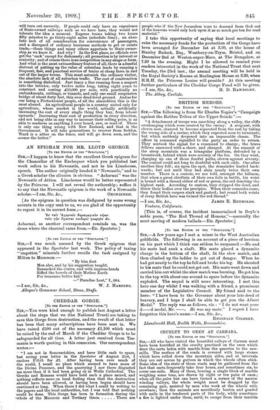BRITISH HEROES.
LTO THII EDITOR or THE "SPECTATOR."] Sin,—The following is from Sir Charles Napier's "Campaign against the Robber Tribes of the Upper Scinde ":-
"A detachment of troops was marching along a valley, the cliffs overhanging which were crested by the enemy. A sergeant, with eleven men, chanced to become separated from the rest by taking the wrong side of a ravine, which they expected soon to terminate, but which suddenly deepened into an impassable chasm. The officer in command signalled to the party an order to return. They mistook the signal for a command to charge ; the brave fellows answered with a cheer, and charged. At the summit of the steep mountain was a triangular platform, defended by a breastwork, behind which were seventy of the foe. On they went, charging up one of those fearful paths, eleven against seventy. The contest could not long be doubtful with such odds. One after another they fell ; six upon the spot, the remainder hurled back- wards; but not until they had slain nearly twice their own number. There is a custom we are told, amongst the hillmen, that when a great chieftain of their own falls in battle, his wrist is bound with a thread-either of red or green, the red denoting tho highest rank. According to custom, they stripped the dead, and threw their bodies over the precipice. When their comrades came, they found their corpses stark and gashed; but round both wrists of every British hero was twined the red thread."
Ventura, California.
[This is, of course, the incident immortalised in Doyle's noble poem, "The Red Thread of Honour,"—assuredly the most moving of modern ballads.—ED. Spectator.]
























































 Previous page
Previous page